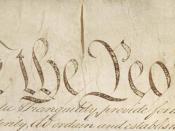When the 55 delegates of the Confederation came together in 1787 to record their ideas in the United States Constitution via consensus, the subject touching upon slavery in the States turned out to be the most debated point. States were openly divided in their economical, political, social and moral ideologies. Yet the impulse for a well-ordered, prosperous union gave way to making many compromises despite those ideals. With the intention to secure participation of all 13 States in the Union, the framers of the Constitution allowed slavery to be continued in the nation where "all men are created equal".
Therefore, it is significant that four of the seven articles of the Constitution concern slavery directly. In Section 2 of Article I the framers stated that slaves should be counted as three fifths of a person, thereby allowing slavery states like Georgia and South Carolina extra representative power and votes in the Congress.
The discussion point between northern and southern states lied in whether slaves are considered property or inhabitants of a state. The northern states argued that in the case of property, the way bonds people had been treated since the beginning of the transatlantic slave trade, slaves should not be counted towards the state Census. Other northern representatives, like New Jersey's Paterson, reasoned what the principle of representation is and concluded that slaves are not voters, therefore should not be representatives.
On the other hand, delegates of southern states actually motioned for equality of white and black people in order to increase the amount of representatives for their state. But herein the sad contradiction is stated: African slaves are used for political advantage but yet are not given the right of a citizen, to be free and vote. The compromise of the three-fifths-clause was determined by the notion that...


